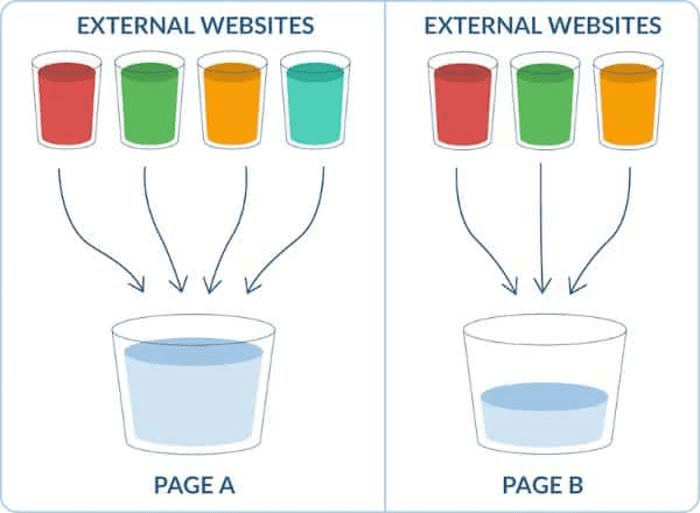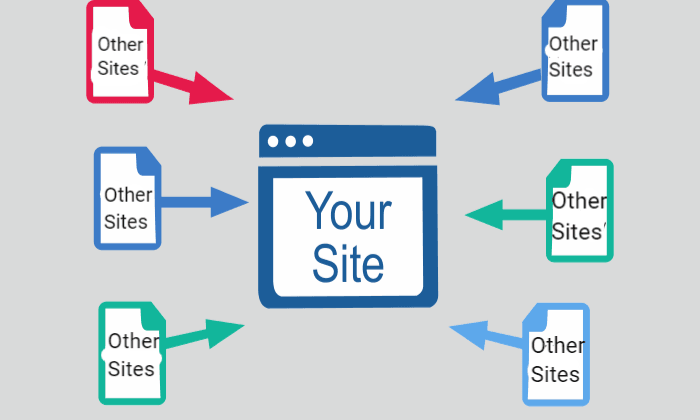Helpful Summary
Overview: We focus on optimizing Google Search Console rankings and explain how to measure and improve them using strategic SEO practices.
Why trust us: At Keyword Metrics, we 10x the SEO efforts of businesses by optimizing content and keywords, resulting in better search engine visibility and significant organic traffic growth.
Why it matters: Understanding and improving GSC rankings increase website visibility, drive organic traffic, and provide insights into your website’s performance, helping you stay competitive.
Action points: Regularly monitor your GSC rankings, optimize underperforming keywords and pages, improve meta tags, focus on high-quality content, and address sitemap issues to enhance search visibility.
Further research: Explore other GSC features that can improve your SEO performance.
Need Help Optimizing Your Google Search Console Ranking?
If you’re curious about your website's standing in Google search results, then consider having a look into your Google Search Console rankings.
Understanding and improving your GSC rankings can feel like cracking a secret code. But don’t worry, we’ve got you covered. In this Keyword Metrics article, we’ll break down everything you need to know about Google Search Console rankings.
Why Listen to Us?
We at Keyword Metrics are dedicated to helping businesses make the most of their SEO efforts. Our content optimization strategies are crafted to deliver significant improvements while saving you valuable time.
Google Search Console Rankings Explained
Google Search Console rankings show how your website performs in Google search results. They show which queries bring users to your site, how often your pages appear in search results and the average position of your pages.
Understanding these rankings is essential to see what’s working and what needs improvement. Your website’s rankings on GSC are based on various factors, including keyword relevance, page quality, and user experience.
How to Measure Your Google Search Console Rankings
Step 1: Access the Performance Report
Log in to your GSC account and navigate to the “Performance” tab. This report shows key metrics like total clicks, total impressions, average click-through rate (CTR), and average position.
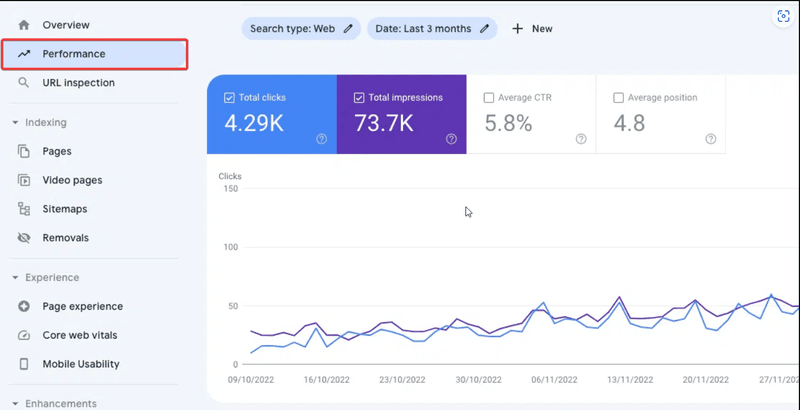
Step 2: Check the Average Position
The Average Position (4.8 as shown below) is the average ranking position of your website in Google search for the specified timeframe. Positions 1 to 10 typically indicate “Google Page 1.”
Hence, the closer your average position is to 1, the better your ranking.
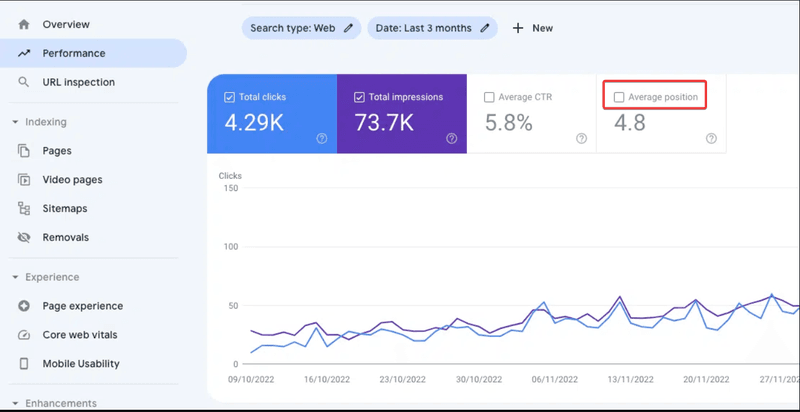
Step 3: Check Queries
Under the “Queries” tab, you can see all the search terms that your website ranks for. This helps you understand which keywords are driving traffic to your site. You can sort the queries by clicks, impressions, or search performance to see which ranks highest and lowest for clicks, impressions, and CTR.
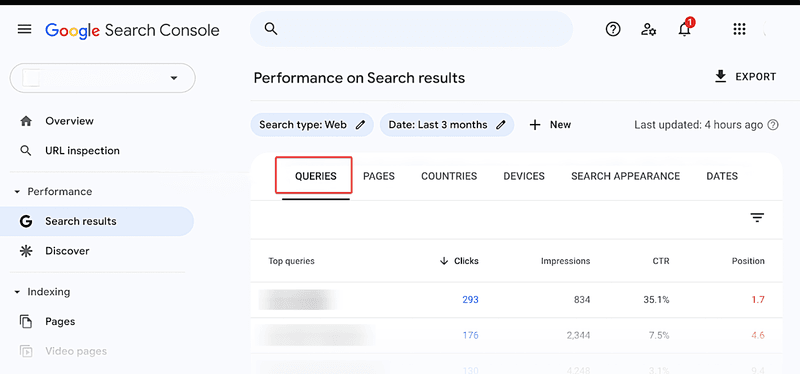
Step 4: Analyze Pages
You can check the rankings of each page in the same way you did for queries (keywords). The “Pages” tab shows which pages on your site are performing well in search results.
You can sort by clicks or CTR to see which pages attract the most organic traffic.
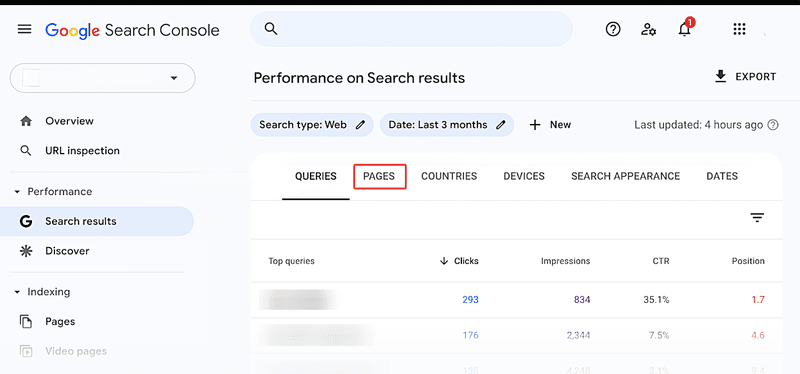
Step 5: Use Filters
Apply filters to narrow down your data. You can filter by date range, country, device, and more to get a detailed, specific view of your rankings.
For example, you can use the device filter to see how your queries perform on different devices. The image below shows differences in average CTR and position for mobile and desktop devices.
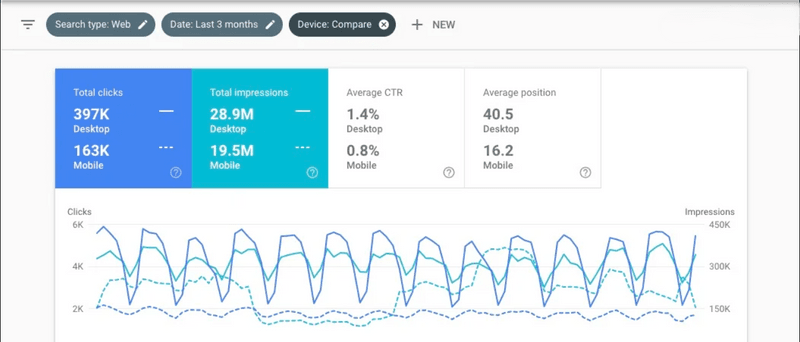
Step 6: Track Performance Over Time
Regularly check your performance report to track changes in your rankings. This helps you identify trends and make informed decisions to improve your SEO efforts.
For example, if a particular keyword or page has driven more traffic over time, consider updating the content to make it even more relevant and engaging. This could involve adding new and more relevant sections, updating images, or increasing the internal linking to these high-performing pages.
How to Improve Your GSC Ranking with Keyword Metrics
1. Identify Keyword Opportunities
Start by looking at the keywords that you’re getting impressions for but didn’t mention in your page content. Then, update your existing content to include these non-targeted keywords.
This might involve adding new sections, updating headers, or incorporating these keywords naturally into the existing text. You can also develop entirely new content specifically targeting these keywords.
Use our platform to scan through all your website pages to find the keywords that fit these criteria. Our powerful filters for keywords, impressions, clicks, CTR, and position provide you with excellent keyword opportunities.
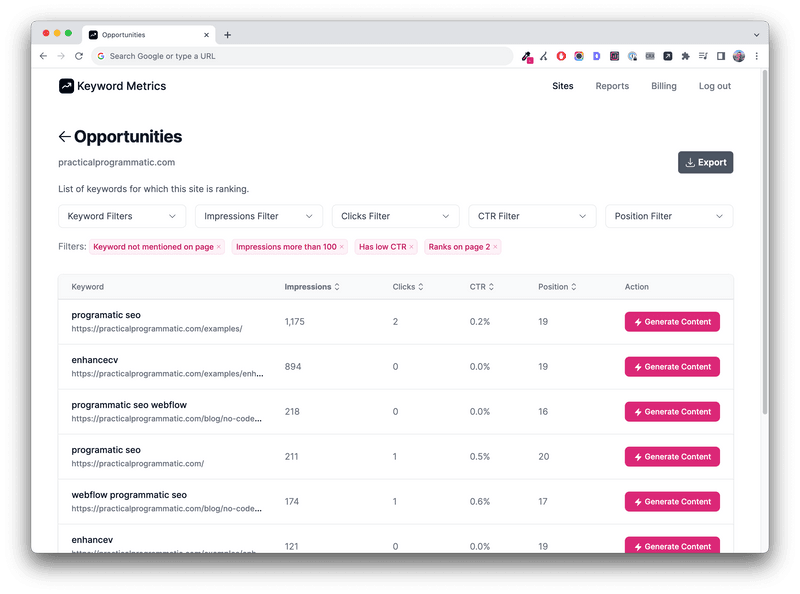
2. Replicate Your Pages With High CTR
Using Keyword Metrics, you can see all your pages at a glance, particularly those with high CTR. These are usually the pages that searchers are clicking on the Google search engine result pages (SERPs).
Analyze the key elements of these pages, including the title tags and meta description, content quality, and overall user experience. Blend these elements into other low-ranking pages by:
Creating engaging and keyword-rich titles and meta descriptions
Improving content quality
Enhancing user experience via mobile-friendliness
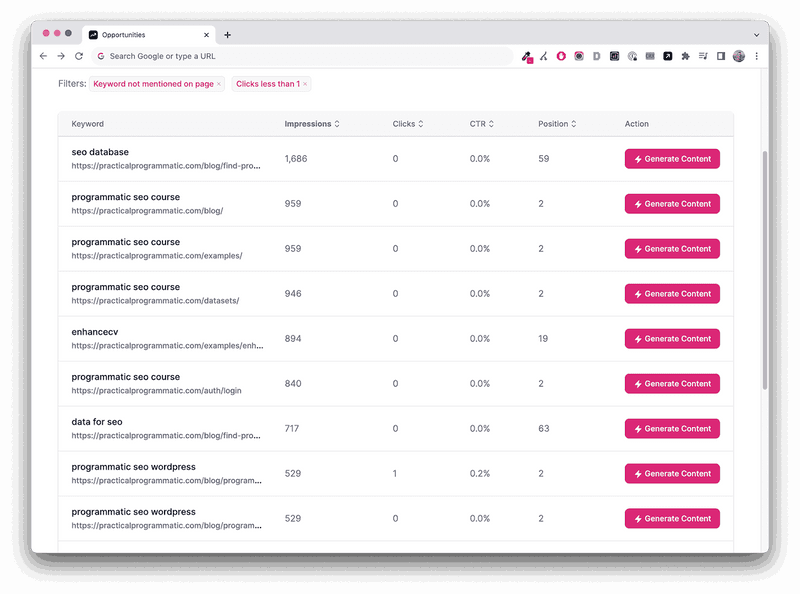
3. Optimize Your Content
Optimizing the content of your website’s pages for the right keywords can improve your GSC rankings. For example, you can update titles and meta descriptions with high-performing keywords. You can also update outdated content with relevant and more detailed information.
At Keyword Metrics, we make this update easier. You can easily generate and regenerate SEO-friendly content snippets that mention high-traffic target keywords, and incorporate them directly into your content.
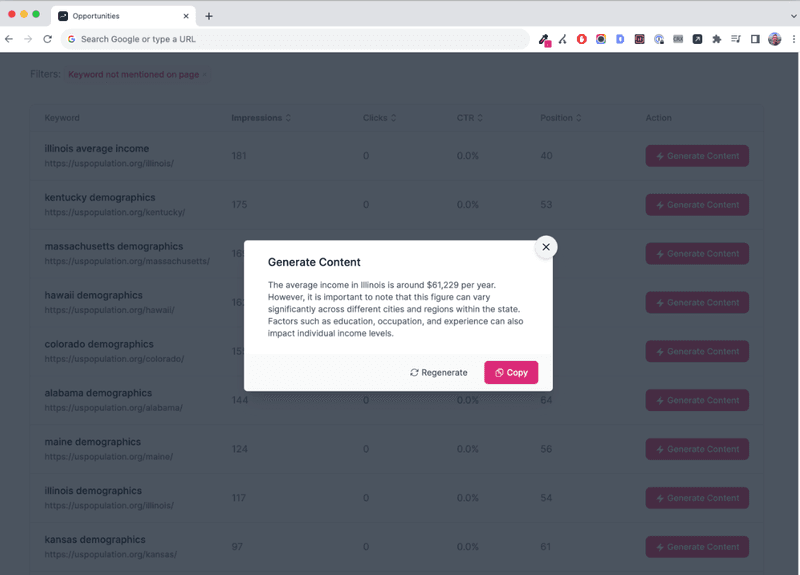
4. Fix Sitemap Issues
Fixing sitemap issues can improve your GSC rankings by ensuring proper indexing and improving crawl efficiency. In essence, it helps Google to go through and index your site better and faster. This increases your chances of ranking high on the SERPs.
While we don't directly handle sitemap issues from Keyword Metrics, we can help you identify which pages are not ranking well, which you can use on Google Search Console to search for potential errors with indexing or crawling.
Rank Better on GSC with Keyword Metrics
Improving your Google Search Console rankings starts with a strategic approach to keyword optimization, and that’s where Keyword Metrics can make a big difference.
By using our tools and strategies, you can identify the most effective keywords for your content, ensuring that you’re targeting the terms your audience is actually searching.
Sign up today to get the best out of our features and make your GSC rankings climb high.
Check out our Guide on Improving Google Search Console Impressions for SEO Success.

